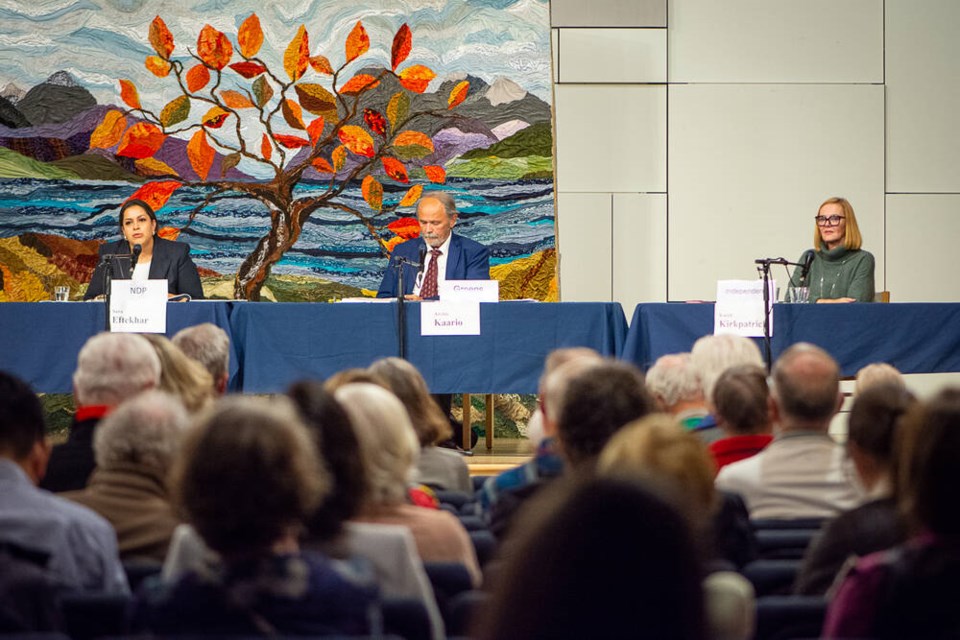Three of four MLA candidates for the West Vancouver-Capilano attended an all-candidates meeting Wednesday night to square off on issues ahead of the fast-approaching provincial election.
As advanced polls closed at 8 p.m., many in the audience at Highlands United Church in Edgemont Village said they were still undecided on who they would cast their vote for on election day, Saturday, Oct. 19.
At the top of mind for constituents at the event were issues like a lack of affordable housing options for North Shore youth, long wait times to see medical specialists and worsening traffic congestion across the region.
Before the debate began, listeners gasped as the moderator informed them that BC Conservative candidate Lynne Block sent her regrets for not being at the meeting.
Later, an audience member asked for an explanation of Block’s absence. Organizers replied they heard from her three hours before the meeting that she couldn’t make it due to a “scheduling difficulty.”
The three other candidates sat behind microphones on the stage: Sara Eftekhar of the BC NDP, Archie Kaario of the BC Greens, and independent Karin Kirkpatrick.
For the first half of the two-hour meeting, they replied to curated questions from the Edgemont Community Association. In the latter half, candidates responded directly to queries posed by constituents.
Here are some highlights from the debate.
Candidates express varying views on new housing legislation
First directed at Kaario, the moderator asked for his position on new housing rules introduced by the BC NDP that allow for more density near transit and on single-family lots, while restricting municipalities’ ability to block new projects.
Aligning his view with the NDP, he said the legislation is an essential way to attend to the housing crisis.
“From a Green Party perspective, that step is an excellent one, and needs to be worked on with municipalities to ensure it’s implemented in a timely manner, and we end up with hopefully more housing than is currently available,” Kaario said.
But there needs to be supplemental finance to local government so infrastructure like transit keeps pace with population growth, he added.
Kirkpatrick, the incumbent in the riding, took a different position.
As the previous shadow housing minister under the now-defunct BC Liberals, she said the idea of increasing density is a good one, but disagreed that it should be applied as blanket legislation.
“So whether you’re West Van or North Vancouver or Trail or Lytton, every community would be treated the same in terms of what it needed to do for the upzoning,” Kirkpatrick said. “We need to respect our municipal governments, which are duly elected by the people in the community.”
How would candidates tackle wait times to see medical specialists?
To reduce wait times for patients to see medical specialists, Eftekhar said the NDP is investing in a new medical school in Surrey with Simon Fraser University, while 120 seats are being added to UBC’s medical program, and hospital residencies are increasing by 48 spots in the province.
“As part of our platform, we’re going to be allowing specialists and all health-care workers actually to be working from province to province,” she said. “We’re also looking at recognizing international credentials so that specialists who are from foreign countries can come here and work.”
Noting the 2021 closure of Capilano Care Centre, Kirkpatrick said the North Shore is in dire need of more long-term care.
“Why is that related to wait lists? … Lions Gate Hospital is often running at over 100-per-cent capacity,” she said. “They are unable to discharge people into long-term care beds.”
“Those patients are taking up acute care beds. Meanwhile, you’re backing up the whole hospital because you’ve got people in emergency that can’t come into a bed because there’s nowhere to discharge people on the other side of it,” Kirkpatrick said.
She also advocated for a limited form of private health care, where the government would pay so people of different means would be treated fairly.
“When I was diagnosed with breast cancer three years ago, I went and I got an MRI immediately through a private health care provider care,” Kirkpatrick said. “It was going to be a month for me to get that same MRI through our public system.”
Candidates pitch new bridge and buses to solve congestion
Kirkpatrick – who was asked the most questions from audience members – said she would push for a replacement to the Ironworkers Bridge with a new, 10-lane span with HOV lanes, as well as dedicated lanes for buses and active transportation.
“It’s 60 years old. A couple years ago we had a big hole in the middle of it for a period of time,” she said. “It is in desperate need of replacement.”
The BC NDP has invested record funding into transit, which includes increasing the number of SeaBus sailings and adding the R2 RapidBus, Eftekhar said.
“We do want to invest in the Second Narrows Bridge, but building a 10-lane bridge will just cause a traffic bottleneck to Vancouver and cause it to get worse,” she said. “What we are going to be investing in immediately is putting in a bus that goes from Park Royal to Metrotown, but then also investigating RapidBus from Park Royal to Metrotown.”
Kaario said the other parties are underestimating the usefulness of the carbon tax, which could be used to fund transit and other infrastructure projects.
“I think the NDP has to take a broader look at this situation rather than have a major reaction to any federal government initiative to stop the carbon tax being used,” he said.





